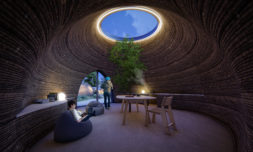Architecture students feel ill prepared to tackle the climate crisis in their future jobs, according to research from UK climate activist groups. Calls are now urgent to bring sustainability to the forefront of the curriculum.
If we’re to ensure the long-term prosperity of our planet, the next generation of architects will have to make sustainability a keystone of the construction industry.
In terms of meeting that requirement, however, it appears we’ve yet to start preparing in any meaningful way. Despite the delicate situation we find ourselves in, aesthetics are still valued over sustainability according to those studying structural design modules.
UK research conducted by climate activist group Architects Climate Action Network (ACAN) has revealed that many student architects in the region feel ‘ill equipped to mitigate the effects of the climate and ecological emergency.’
With the construction industry currently accounting for around 42% of the nation’s carbon emissions, students and climate NGOs are rightly demanding wholesale changes to course curriculums.
ACAN’s survey, which pulled together architecture students from across the country, worryingly showed that 76.9% of the sample felt unprepared for their future work, while 69.2% pointed to a distinct lack of climate consideration from their tutors.





















